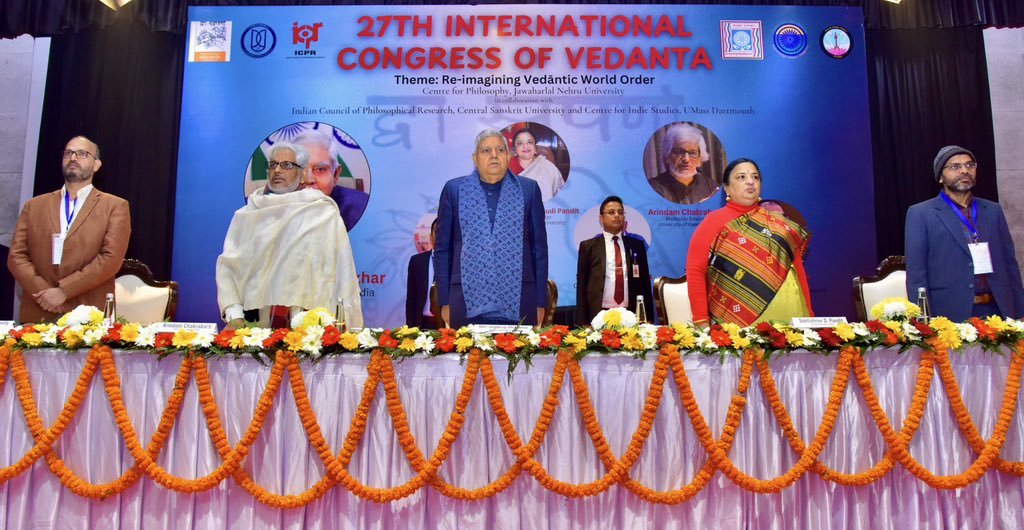Vedanta Offers Ethical Solutions to Modern Challenges, Says VP Dhankhar
Vice-President Dhankhar Advocates Vedantic Wisdom as Solution to Modern Challenges, Criticizes Misuse of Secularism and Ignorance of Indian Heritage.

- Country:
- India
Vice-President Shri Jagdeep Dhankhar, delivering the inaugural address at the 27th International Congress of Vedanta at Jawaharlal Nehru University, New Delhi, called for the revival of Vedantic principles as a guiding force in addressing contemporary global and national challenges. He expressed concern over the growing detachment from India’s cultural roots and the widespread ignorance about Sanatan Dharma and Vedantic texts.
“It is ironic and painful that references to Hindu and Sanatan evoke baffling reactions in Bharat,” Shri Dhankhar said. He attributed this detachment to colonial mindsets and a lack of understanding of India’s intellectual heritage. “This dismissal often stems from inefficient understanding, and is perpetuated by a structured, sinister ecosystem aimed at distorting our traditions under the guise of secularism,” he added.
Reviving Vedanta for Modern Solutions
The Vice-President emphasized Vedanta’s contemporary relevance, particularly in the context of global issues like climate change, misinformation, and resource depletion. “Vedanta does not merely answer questions; it dispels doubts and satisfies inquisitiveness, offering a harmonious balance between ethical wisdom and technological solutions,” he noted. Shri Dhankhar described Vedanta as a "blueprint for the future," capable of bridging timeless wisdom with the ethical demands of modern challenges.
He proposed incorporating Vedantic principles into educational curriculums and making them accessible beyond academic circles. “Let us bring Vedantic wisdom from ivory towers to classrooms, ensuring its reach to every corner of society. This will catalyze sustainable development, ethical innovation, and harmonious coexistence,” he suggested.
Cultural Roots and Inclusivity
Highlighting the richness of India’s cultural roots, Shri Dhankhar remarked, “We must stay alive to our philosophical heritage, which emphasizes inclusivity. Bharat, with its values and social fabric, defines inclusivity like no other nation.” He advocated for deeper engagement with Indian philosophy, urging citizens to explore the quintessence of Vedantic values.
The Role of Expression and Dialogue
The Vice-President underscored the importance of dialogue and expression in upholding democratic values. “Expression and dialogue are the cornerstones of civility,” he asserted, lamenting their erosion in public discourse and parliamentary proceedings. He criticized disruptions in the Parliament, urging representatives to adopt a Vedantic approach to foster harmony and productivity. “If Members of Parliament studied Vedanta, they would be more receptive and constructive in their duties,” he said.
Shri Dhankhar also called on citizens to hold public representatives accountable for their performance. “People demand accountability from doctors and public servants, but why not from their representatives who fail to perform their duties?” he questioned.
Vedanta as a Solution to Discord and Intolerance
Decrying the rising intolerance and rigidity in public discourse, Shri Dhankhar warned against the perils of arrogance and the refusal to consider diverse perspectives. “The steadfast belief in one’s perceived righteousness and the dismissal of other viewpoints leads to societal discord and undermines democratic values,” he stated. He described this trend as a significant contributor to global restlessness and disharmony.
International Scholars Join the Dialogue
The event witnessed participation from prominent scholars, including Prof. Santishree Dhulipudi Pandit, Vice-Chancellor of Jawaharlal Nehru University, and Shri Arindam Chakrabarti, Emeritus Professor at the University of Hawaii, USA. Students, faculty members, and other dignitaries also attended, enriching the discussions with diverse perspectives on Vedanta’s relevance in modern times.
Call to Action
In conclusion, Shri Dhankhar reiterated his call to reconnect with India’s spiritual and philosophical heritage. “Vedanta is not a relic of the past but a practical guide to overcoming the challenges of the future. It is our duty to ensure that its wisdom is preserved, practiced, and propagated,” he affirmed.










